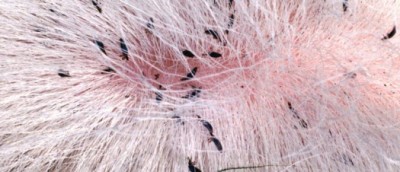Dealing with Lice on our Ruminant Species
Amy Barkley, Team Leader & Livestock Specialist
Southwest New York Dairy, Livestock and Field Crops Program

There are a few parasites that producers will interact with over the course of keeping stock. One of those is the humble louse. Lice are small, about the size of a pinhead, and can be hard to spot unless either a.) you're looking for them or b.) they're in such large numbers that they are causing discomfort to the animal. There are two types of lice: those which consume dead skin (chewing lice) and those which consume blood (sucking lice) Animals with heavy infestations may not gain well, lose weight, drop in milk production, present with anemia, and/or have areas of hair rubbed off where they are trying to scratch the always present itch. Of course, chewing lice don't cause anemia because they don't suck blood, but they do result in discomfort. The economic threshold for treatment is achieved once 10 lice or more per square inch are counted on any one animal in the herd or flock.
Once an infestation is identified, the first bit of good news is that it's relatively easy to treat, but takes dedication on behalf of the stockowner. The second bit of good news is that lice are obligate parasites. This means that they can't live without their hosts. If your favorite cow leaves some lice when she scratches against a pen support, those lice will die in the environment unless they find another cow to call home.
While producers get the relief of not needing to treat the barn, they do need to aggressively treat all the animals of the affected species on the farm. This is because lice easily transfer from animal to animal, so if one animal is infested, consider that they all have lice to varying degrees.
When treating, we need to think of the louse's biology. These critters take about 1-2 weeks to hatch from eggs. That means that one treatment of insecticide, depending on the label's treatment timelines, may not be enough if that insecticide is only active for a week. For this reason, it's important to treat multiple times, in strict accordance with the label's scheme for lice. Remember that chewing and sucking lice may need different treatment strategies; chewing lice are not susceptible to systemic insecticides because they don't consume treated blood!
Once the lice are controlled, you'll need to check 10-30 individuals in the herd for signs of nits (eggs attached to the hair) and/or adult lice every 2-4 weeks. If either of these are seen at a rate of 10 nits or lice per inch, you'll need to repeat the whole herd treatment. There is a chance they'll come back once eradicated, but vigilance and repeated treatments will keep them controlled. It's also a good idea to isolate and treat any cattle you buy in (if you do) for that 4-6 week period before introducing them to the herd as a precaution.
Looking for more information? Here are some resources used to help put this article together:
Cattle Lice - Cornell Cooperative Extension: http://ccetompkins.org/resources/cattle-lice
Eradication of Lice in Cattle: https://www.ncbi.nlm.nih.gov/pmc/articles/PMC2202344/
Managing the Impact of Cattle Lice During the Winter Months - Kansas State Extension: https://enewsletters.k-state.edu/beeftips/2018/01/01/managing-the-impact-of-cattle-lice-during-the-winter-months/
Lice on Beef and Dairy Cattle - University of Kentucky: https://entomology.ca.uky.edu/ef512
Photo from the University of Wisconsin.
Upcoming Events
Boots in the Barn: Cornell Dairy Research Updates
January 13, 2026
January 20, 2026
January 27, 2026
February 3, 2026
February 10, 2026
February 17, 2026
February 24, 2026
Join us for some or all!
Deerworm and Flukes in Small Ruminants Webinar
February 25, 2026 : Deerworm and Flukes in Small Ruminants Webinar
Dr. Mary Smith from Cornell's College of Veterinary Medicine and Dr. Rachel White from UMaine Cooperative Extension will be discussing the lifecycles, signs, prevention, and management of deerworm and liver flukes in small ruminants.
NYSDEC How to Get Certified Course
March 3, 2026 : NYSDEC How to Get Certified Course
Ellicottville, NY
NYSDEC training course in preparation to take the pesticide applicator exam.
Announcements
Cows, Crops & Critters Newsletter Sponsorship
TRYING TO REACH GROWERS AND AGRIBUSINESSES IN OUR SOUTHWEST REGION OF NEW YORK?Weekly Email Update: Shared with 625+ households who have signed up with our program.
Monthly Paper Mailer: To reach our stakeholders and farmers who lack internet access, we send out a monthly mailer where your company's logo and contact information would be featured with a mailing list of 330+ households.
If you sponsor our weekly and monthly publications you reach approximately 955 households.





